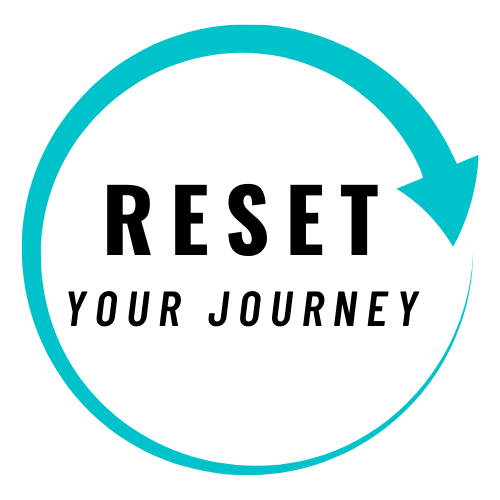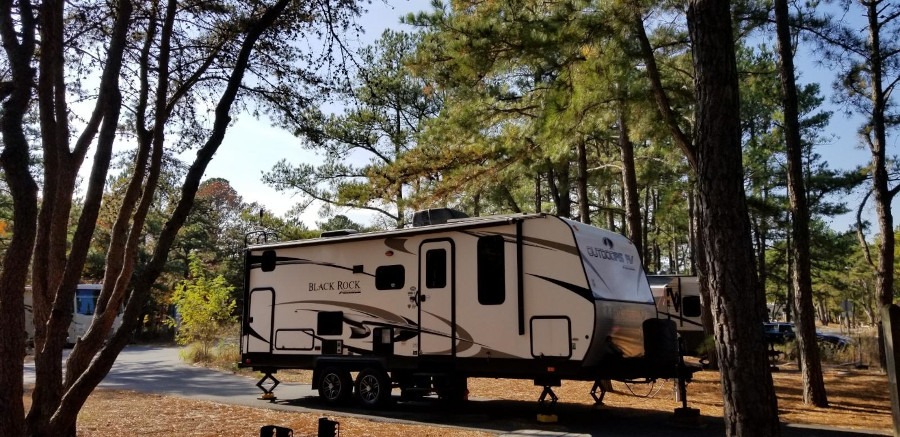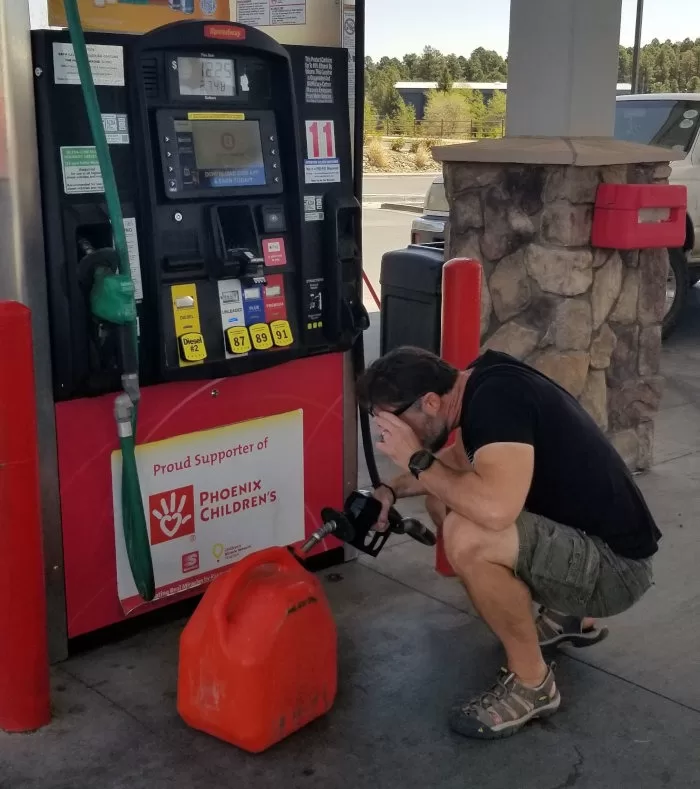Last Updated on 03/02/2024 by Glynn Willard
The average for our 3-month snapshot came out to $2403/month. I’ll break it all down for you throughout the article.
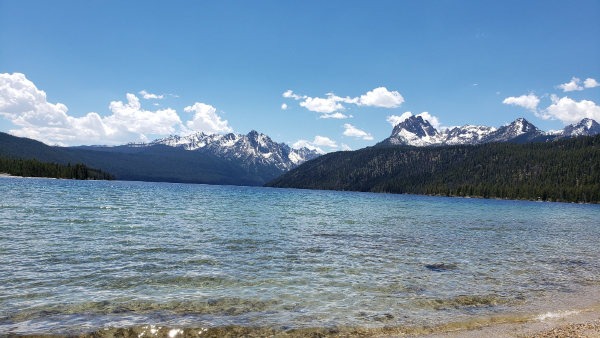
How can we afford to make this our temporary backyard?
Before setting out on this journey, we watched so many full-time RVing YouTube channels on the subject of expenses.
Let’s face it, the biggest question many have is “How much is it going to cost?”
If it can’t be done within one’s budget, what’s the point?
And one of my biggest questions before starting was “What will the first few months cost?”
Why did I ponder this question? For two reasons.
- First, if we dislike living full-time in an RV, how much money will I lose?
- And second, how much will all my “newbie” mistakes cost me before figuring out how to live inexpensively in an RV?
Let’s get the financial microscope out and explore our real costs for the first three months of RV full-time living.
Our Perspective On The Costs Of Full Time RVing
For the first three months, full-time RV living cost us less than we originally thought. Before we sold our traditional home and our business, our life was expensive.
So, I knew, no matter what, living full-time on the road would cost less than we were used to. But there’s one large caveat in our situation.
Our income diminished by 85%.
That’s a huge adjustment, so we had no choice but to be frugal and eliminate all monthly payments.
But I will say this much; starting with a frugal mindset sets the stage for ongoing inexpensive living!
What Did We Think Full Time RV Would Cost?
I’ll be honest, I budgeted more money a month than was necessary ($3,000). But that’s the business owner in me. And I’m extremely frugal (not that I had a choice).
I figured our three largest costs would be lodging, groceries, and fuel. I was on the right track, but grossly overestimated one of the three listed.
Which one? Lodging.
Most full-time Rvers initial thoughts on full-time RV living is touring the United States from RV parks to state parks.
I quickly learned that we’re not fans of RV parks and campground fees.
They’re crowded and expensive. We are committed to boondocking on BLM and USFS lands (public lands).
It costs nothing, offers more space and always has better views. It’s a great way to save money!
You can read more about our take on boondocking in our article: RV Boondocking For Beginners (Guide & Tips To Free Camping)
One Month Full Time Cost
The first month on the road, we spent a total of $2087. Again, the two largest contributors were the grocery store ($708) and fuel costs ($589).
I believe the grocery bills for the first month were skewed.
Since we stocked up on a lot of essentials before leaving, it saved us money on the road.
The next three largest expenses were entertainment ($180), dining out ($115), and campsite fees ($110).
The rest were incidental expenses.
We moved every one to four days in the first month, so our fuel costs were expensive. But there’s one thing I have to point out.
We were paying approximately $2.40 a gallon for diesel.
The current price I’m paying is between $3.40 and $3.99 a gallon for diesel.
Adjusted for current fuel rates, that would have cost approximately $884 instead of $589.
The increase in fuel prices has had a real impact on the finances. So, make sure you budget accordingly.
We regulated the monthly expenses of fuel with longer stays (moving less frequently).
Two Month Full Time Cost
I totaled the first two months for this section. And that ended up being $4,502 for the two months.
Now, the grocery costs are no longer skewed for a family of four. The total for groceries over two months was $1,670. Fuel costs for the two months were $1,303.
Dining out ($350) and entertainment ($210) were the next two largest expenses.
Camping fees are now only totaling $140 over the two months. Not too bad since we’re learning to avoid paid campgrounds for our “tiny house.”
Three Month Full Time Expense

Three months of full time RV expenses
Now, let’s look at all three months combined.
The grand total for the first three months of full-time RV living was $7,209.
Here are the exact numbers, so you have a good idea of what you’re up against.
Some of your fixed overhead will be different of course. Keep in mind, that we have no debt or RV payment.
- Grocery Bill: $2,554
- Fuel Costs: $2,089
- Campground Fees/RV Parks: $374
- Dining Out $360
- Repair and Maintenance Costs: $245
- Cell Phone: $225
- Recreation: $224
- Gifts: $196
- Hot Spot: $150
- Laundry Facilities: $130
- Personal Care: $110
- Supplies: $110
- Hobbies: $100
- Clothing: $78
- Car Wash: $70
- Pet: $65
- Propane: $50
- Misc. RV Expenses: $39
- Tolls: $25
- Postal: $15
- Groceries: $851
- Fuel: $696
- Campground Fees/RV Parks:$125
- Dining Out: $120
- Repairs and Maintenance: $82
- Cell Phone: $75
- Recreation: $75
- Gifts: $65
- Hot Spot: $50
- Laundry Facilities: $43
- Personal Care: $37
- Supplies: $37
- Hobbies: $33
- Clothing: $26
- Car Wash: $23
- Pet: $22
- Propane: $17
- Misc. RV Expenses: $13
- Tolls: $8
- Postal: $5
And here’s the average monthly costs spent on each category.
This should give you a pretty good idea as to what your similar expenses could be. Make your adjustments as needed based on your financial situation.
As We Progressed, We Learned How To Save
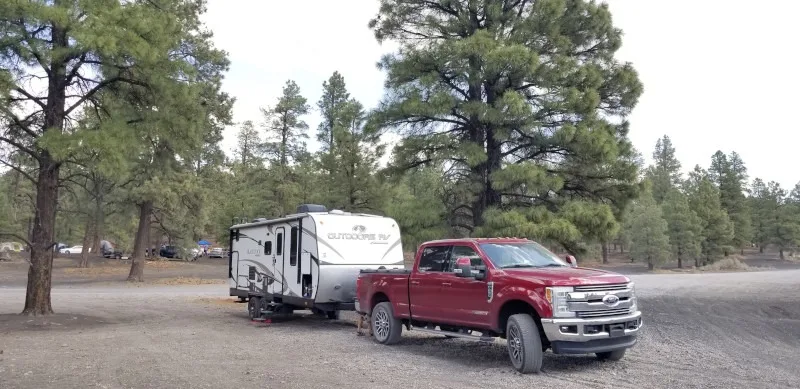
When you first hit the road, you’ll be in “vacation mode.” Be careful and make sure this doesn’t last too long or your average cost of living will escalate.
Remember, this is your potential new life now, not a vacation.
Eliminating the “vacation mode” mindset had a large impact on saving money for us.
We learned to slow down and not be in a rush. Besides, what’s the need to rush? Unless, of course, you’re running from uncomfortable weather (or tornadoes).
We learned where to find free or inexpensive water, dump stations, and fuel. We learned the art of boondocking.
And we learned how to find dispersed camping. All of this adds up. And it helps with the increased fuel prices as well as repairs experienced in later months.
If dispersed camping is on your agenda, make sure you buy the correct type of RV for boondocking.
What Is The Best Way To Save Money In An RV?
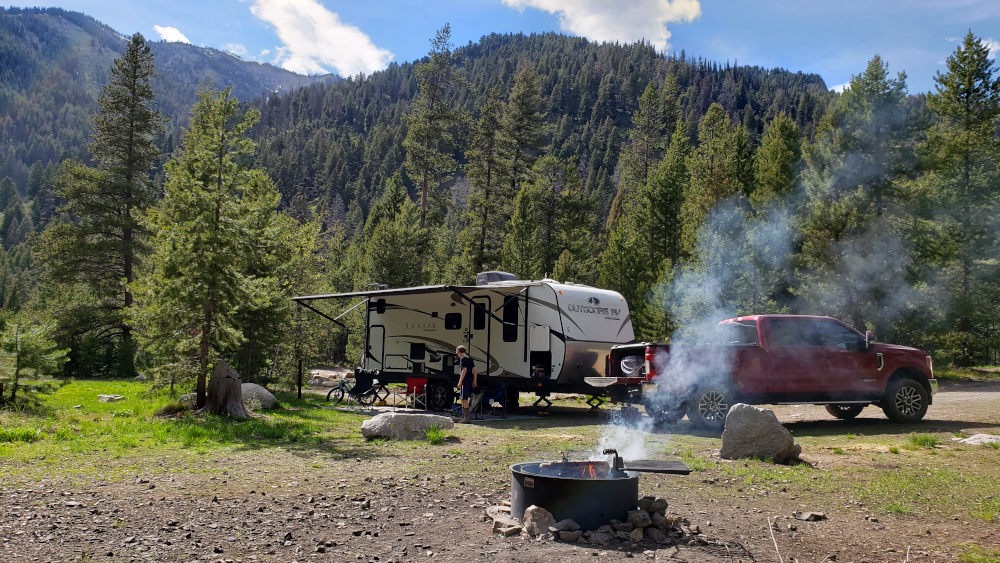
Campsites like this cost nothing for 10-14 days!
If you asked me before departing on YOUR journey how to save the most money, here’s what I’d tell you (in a nutshell).
- Avoid new RVs and start with a used RV. It’s already broken in and had its warranty work taken care of.
- Consider looking at travel trailers since they offer the best bang for the buck.
- Avoid campground fees and boondock on public land or Boondockers Welcome instead.
- Move less frequently to save on fuel costs. In other words, slowing down is a better option.
- Limit dining out to once a month and special occasions will contribute heavily to a lower cost of living.
- Join RV clubs such as Passport America or FMCA to get a significantly discounted rate on things such as internet connection, RV insurance, health insurance, fuel costs, RV maintenance, and upgrades.
It’s that simple. This list alone will have a global impact on your cost of living (for the better), period.
What Were The Biggest Expenses For The First Three Months Full Time?
As mentioned previously, groceries and fuel make up the bulk of our expenses.
Since we do so many free activities, our entertainment contributes very little to our expenses.
Those two expenses are still less than a mortgage payment and property taxes on a primary residence.
Using an Inter-agency Park Pass makes it easy to use national parks for entertainment, dumping the rig and fresh water.
The next two largest expenses on the list were camping fees and dining out. And they were negligible compared to groceries and fuel.
I have to disclose that I incorporate dump stations and freshwater that I have to pay for into the “camping fees” line item. But I think that’s fair.
Can You Save Money Living Full Time In An RV?
As I mentioned above, by boondocking consistently, we save a lot of money. We also do more “free activities.”
This includes hiking, biking, beaches, museums, campfires, National Parks (park pass), etc.
Also, the limited space (minimum square feet) of tiny homes costs very little to heat and cool.
I often watched and read other full-timers input on expenses and many stated that if you spent 4k a month in a “sticks and bricks” house, you’d likely spend the same living in an RV.
I agree and disagree. If you’re objective is to save money, you’ll decide to save money by learning the necessary methods.
We’ve met so many extraordinary people on the road who full-time. Some live exuberantly and stay in luxury RV resorts or buy lots of solar panels and batteries.
Read that as spend more money.
But many have figured out how to live comfortably on as little as 1k a month for a single person. So, it can be done.
If you know that you’re only going to have a 2.5-3k a month budget and a little money in savings, just know, it can be done easily.
Proceed with caution if you have a lot of debt, are still making payments, and don’t have enough money to cover unexpected repairs or emergencies.
Being debt-free is a game changer for this style of living. And let me just tell you how liberating it is!!!!
Are We Saving Money Full Timing?
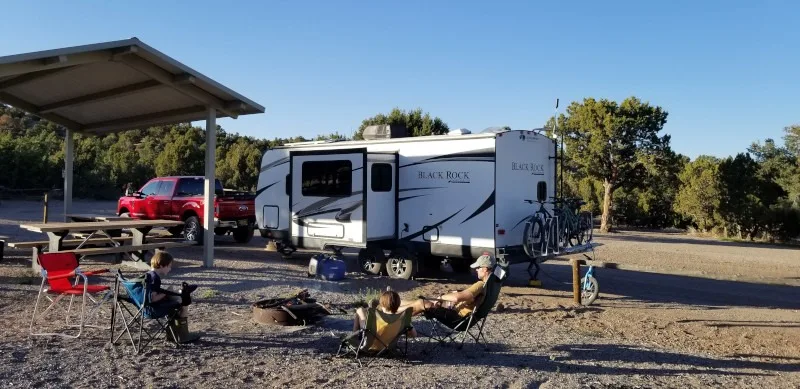
You bet we are! I don’t even want to disclose how much we were spending a month on our house, maintenance, entertainment, and living expenses.
And we were still putting money into savings!
I guess some would say that’s the “American dream.” I beg to differ. Being debt-free and a free spirit is
So, even though we make a lot less money than we used to, we also spend a lot less money. But have a much richer life.
I’m not saying it’s all rainbows and unicorns. We certainly have some hardships. Sometimes it’s difficult to find a data signal, a good spot to disperse camp, a dump station, or water.
But these are moot compared to many problems people experience.
In fact, as I write this we just wrapped up almost five days of a stomach bug. Dysentery in an RV sucks! But we managed.
At least in a house, you can curl up in front of a TV. We don’t have one of those.
How Do You Save Money Living Full Time In An RV?
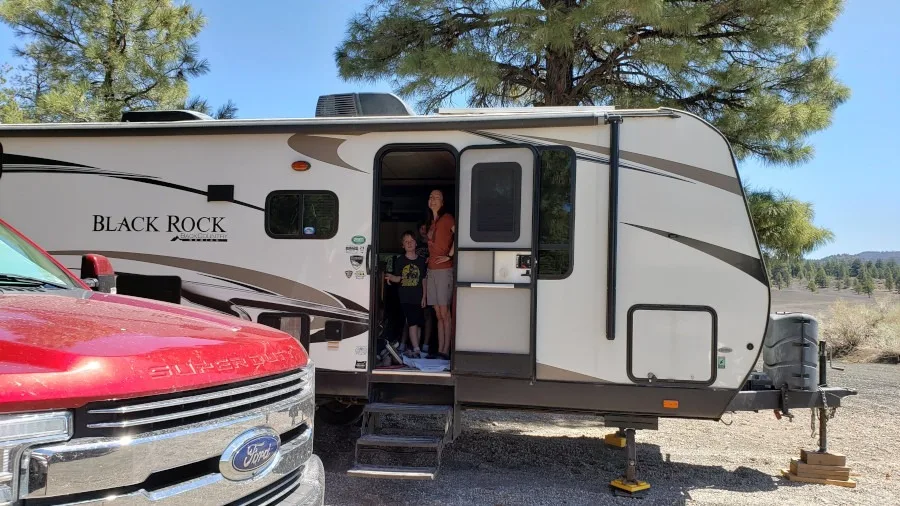
I mentioned above that the biggest ways to save money in the RV lifestyle are:
- Start with a used RV. A travel trailer is a great bang for the buck.
- Avoid campgrounds and instead boondock on public land or Boondockers Welcome.
- Move less frequently to save on fuel. In other words, slow down.
- Limit dining out to once a month and special occasions.
- Join RV clubs for discounts.
I’m going to add one more way to spend less. Avoid remaining in “vacation mode.” It’s tougher than you think.
Cost Of Living In A 5th Wheel
We may not have a fifth wheel, but we learned via collaboration with Journey With The G’s what they spend a month for 2 people living in a 5th wheel.
They give a solid break down with real-world expenses in their article: How Much Does It Cost To Full Time RV?
Final Thought
There are several great takeaways from this article.
- Starting debt-free is a game changer
- Moving less frequently saves a lot of money on fuel.
- Avoiding paid campgrounds saves the most money. Learn to boondock. The more expensive rig that’s built for boondocking will end up being less expensive in the long run. That only applies to living full-time in the rig.
- Minimize dining out to one or two times a month.
- And finally, figure out that some of the most rewarding activities are free.
Update
Here’s a video that updates this article with a 6-month window of expenses.
Have you estimated what it would cost for you to live full-time in an RV?
Meet the author.
We appreciate any help in bringing you great content. Donate or buy us a coffee on our Ko-Fi site. Or subscribe to our YouTube Channel.Thank you so much for being here!

